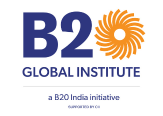Research Reports
Thematic Area: Capacity Building, Skilling, and Mobility

Driving Financial Inclusion through Financial and Digital literacy
Essential skills for financial inclusion
Financial inclusion, by way of providing affordable financial products to businesses and individuals helps promote economic growth and employment. By ensuring access to the vulnerable groups including women and the poor, financial inclusion is a powerful tool that can effectively reduce poverty, especially in the developing and less developed countries.
However, around 1.4 billion people globally are still without bank accounts1. The lack of access to financial resources causes major hurdles to livelihoods which in turn impedes employment and business growth.
Financial education and skills are therefore critical for protecting and empowering financial consumers and driving the financial inclusion process. With the rapid rise of complex financial products, financial education along with financial reskilling and upskilling can help in shaping financial behaviour and attitudes, while empowering individuals.
At the same time, in an era of rapidly expanding digital financial services and the advent of fintech, digital literacy has become a prerequisite for the effective use of digital financial services. Therefore, access to digital skills, besides financial literacy, is equally important for ensuring equal access to financial products for all.
Financial literacy and current gaps
The OECD defines financial literacy as a set of awareness, knowledge, skills, attitudes and behaviour that enable individuals to make informed and smart financial decisions.
The level of financial literacy is an essential indicator of people’s ability to make sound financial decisions and is considered as one of the top core skills for navigating the complex financial landscape in the 21st century.
However, financial knowledge continues to be low globally, across diverse population subgroups and countries at various stages of development.
It has been documented that financial literacy positively impacts access to finance and enhances the competitiveness and performance of micro, small and medium enterprises (MSMEs)2. However, MSMEs face significant financing gaps, including inadequate access to formal credit,high cost of credit and limited availability of risk capital. According to the International Finance Cooperation, the MSME finance gap stood at USD 5.7 trillion in 2024, which increases to USD 8 trillion with the inclusion of informal enterprises3. The lack of financial literacy and technology skills has been identified as a leading cause that hampers business growth among the MSMEs.
